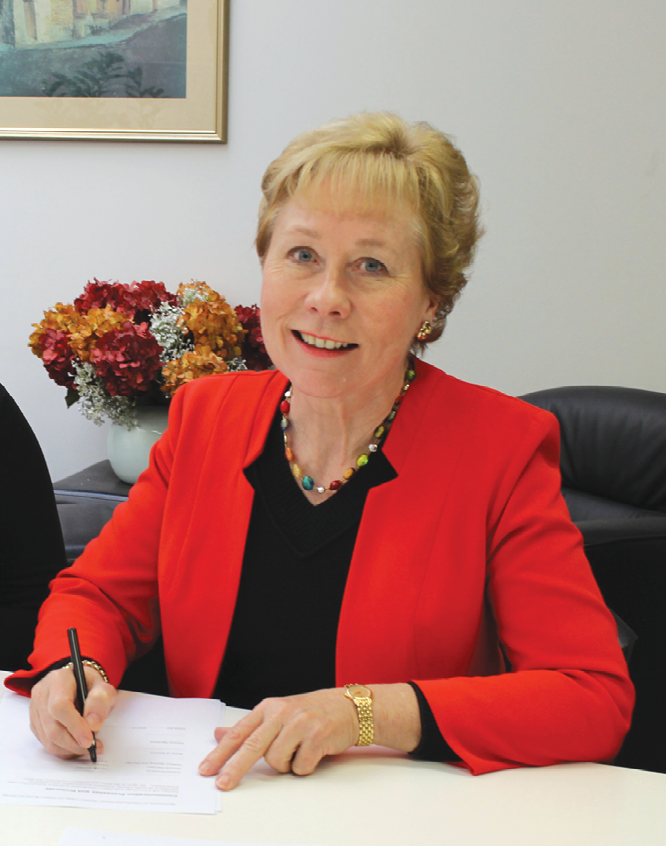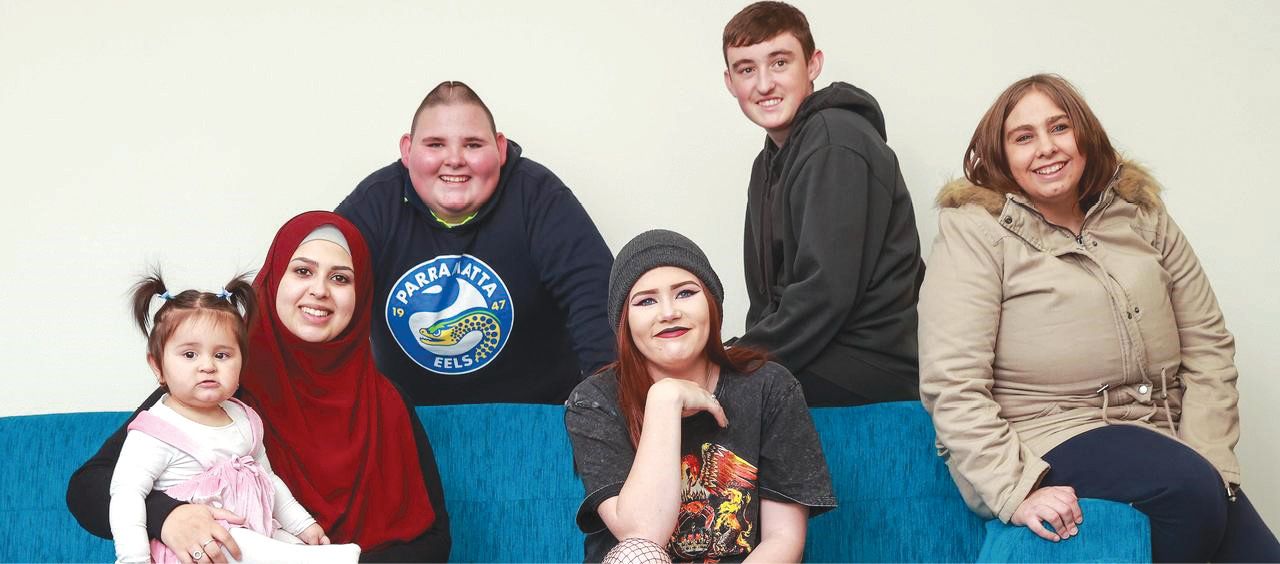Young people disconnect from mainstream schools for a variety of reasons including mental health challenges, complex family situations, repeated expulsions, drug or alcohol problems, becoming parents as teenagers, socio-economic disadvantage, undiagnosed low literacy or learning difficulties, behavioural challenges, bullying, gender dysphoria – the list is long.
Principal Carolyn Blanden believes all students, even juvenile offenders, deserve a second chance. Her school, Warakirri College, has campuses in Blacktown, Fairfield and Campbelltown, in Sydney’s west, and welcomes students aged 14–22.
“What alternatives do they have but to fall back on a life of crime, if they have no chance of an education?” Blanden said.
“At Warakirri College we do our best to provide opportunities for students and teachers to achieve their goals. Many of our students are amazed at what they are able to achieve in an environment that is empathetic, flexible and creatively supportive.”
“I would encourage any teacher who wants to make a difference to consider Warakirri or a school like it. Our staff are given opportunities to fast track their career through professional development and mentoring together with leadership opportunities which are rarely available to young teachers.”
Blanden’s own career path is impressive and she believes the diversity of her experiences has enabled her to build Warakirri College from five staff and 38 students to three campuses with a fourth under construction and opening next year.
Baptism by fire
A successful graduate of a non-government school, Blanden’s first post was as a music teacher, even though she had studied geology (an achievement in an era when women rarely studied science).
It was a baptism by fire. Burwood Girls High School, in Sydney, had a large cohort of new migrants who did not speak English. Blanden said those students would often end up in her music class, because it was assumed music didn’t require English skills. She learned that if a lesson wasn’t sufficiently engaging, her students would simply climb out the window.
After a few years she took a job as an education officer for a group of financial institutions and visited 150 schools across NSW, speaking to 55,000 students in Commerce and Economics classes.
“What I learnt from that experience is that it didn’t matter whether you went to a state or private school, a wealthy or poor school, it was how the teachers interacted with the students that set the tone,” Blanden said.
She resumed teaching at Knox Grammar School in Wahroonga, where she finally got a chance to teach science. It was the early 1980s, and Blanden was one of only three women teachers in the traditional boys’ school.
“There were no female toilets in the common room, we had to walk a long way,” she said. “The only women in promotions positions were in charge of cooking, cleaning and the school hospital.”
When absent from a meeting, Blanden was appointed Chair of the Affirmative Action Committee – an invidious role in a school that preferred not to employ women. However, it gave her a voice and great experience, and by the time she left Knox 15 years later, things were changing, and there were 45 women on staff.
During her time at Knox, Blanden became involved with the Board of Studies as Chair of the HSC Exam Committee in Geology, Supervisor of Marking for 4-Unit Science and membership of the team that started development of the Standards Referencing system.
She moved to Tara Anglican School for Girls in Parramatta as Director of Studies then became Deputy Principal, where she was grateful to be mentored by her first woman principal, Dr Ruth Shatford.
Influential feminist
Moving to Meriden Anglican School in Strathfield as Principal, Blanden was influenced by the biography of feminist Betty Archdale, a law graduate and captain of the English women’s cricket team, who was goddaughter of British suffragette Emmeline Pankhurst. Archdale became headmistress of Abbotsleigh Girls School in Wahroonga in 1958, where she introduced science to the curriculum and challenged the social norms that had limited the aspirations of generations of schoolgirls.
However, the demands of principalship coincided with a tough time in Blanden’s life. Her husband became unwell, and her Year 10 son was struggling with his own demons. She decided to spend more time with her family and quit education for a while.
She took a job with an international consortium, working on several projects, including accreditation of the first Australian school in China to deliver the HSC; developing a machine that could take water from the atmosphere for communities struck by a natural disaster; and managing a $52 million building project.
After a few years she returned to education as Head of College at Galstaun College at Ingleside, in Sydney’s north, a bilingual English/Armenian school. The opportunity to engage with the Armenian community was a rewarding experience that enabled Blanden to more effectively serve the refugee communities of Fairfield and Blacktown.
The offer of principalship at Warakirri came about through a chance meeting over coffee, but Blanden felt she’d been building up to this position all her life.
Warakirri College, an initiative of social enterprise MTC Australia, has 350 students and 70 staff across its three campuses. Blanden said the demand for alternative education is exploding with the increasing prevalence of youth mental health issues, trauma and young people needing a place that responds to their individual needs.
She has acted as an adviser to other organisations setting up similar schools, such as Gateway Community High in Carlingford in Sydney’s north west, which opened this year.
Courage is key
It is the students’ courage that motivates Blanden.
“Just getting up and coming to school every day can be such a challenge for them,” she said. “I have a student who must get his five brothers and sisters ready for school, then tries to get his mum, who has depression, out of bed, before he can get himself ready. He’s been in juvenile detention too. But he keeps coming. We admire him so much.”
One student had to do all her oral assessments in an empty classroom with the teacher hiding under a desk to accommodate the student’s extreme anxiety. Now she is a ‘golden key’ honour student, one of the world’s top 15 percent of achievers at university.
Blanden is currently putting together a program for young mums to attend class and get support with child rearing, as they are at high risk of having their children removed by Family and Community Services.
“They have no idea how to bring up a child, they are just children themselves,” Blanden said.
Blanden has also worked with the NSW Education Standards Authority (NESA) to make Warakirri one of the first independent schools accredited to deliver distance education because some students are simply too anxious to come to school, their behaviour is too extreme, or their crimes prevent attendance.
Blanden said the school is often the students’ first experience of having a place to go where they can feel safe all day. It provides adult role models who are consistently caring and genuinely interested in the students’ growth and development. It’s a place where they can find stability and direction, often a novelty in their lives.
“One of our students had a baby on Monday morning and brought him into school on Tuesday morning. It was like she was showing her family her new baby.”
The college actively strives to find jobs for students even when they have left school and are in their 20s.
Of course, during COVID lockdowns, all students must try to learn from home, but this is no simple task although the school uses the CANVAS platform for online classes. Many students have had computers loaned to them, but others have no internet access, so the teachers do home deliveries of learning resources and provide daily one-to-one telephone mentoring.
The teachers always go the extra mile for their students, providing them with clothes for interviews (a barefoot mother was once given shoes), prescription glasses, money to apply for university, family food hampers and other support.
“Being able to make a difference to the community, giving young people a chance to complete their education, have a career and not become welfare dependent, that’s what makes it all worthwhile,” Blanden said.
On top of her busy schedule, Blanden finds time to be an active member of the IEUA NSW/ACT Branch, having served on its Education Issues Committee and Principals’ Sub Branch.
“I grew up believing unions were just about strikes, but I’ve discovered that our union is a constructive organisation that contributes greatly to our profession,” she said.










































































































































